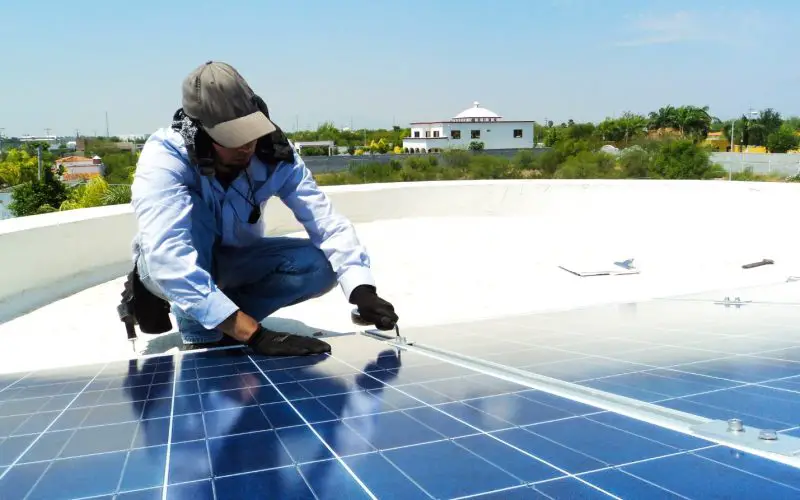In 2021, solar energy generation increased by 22%, setting a new record. If we keep up with 25% average annual generation growth from 2022 to 2030, then we’ll be on track to follow the Net Zero Emissions by 2050 Scenario.
It’s easy for homeowners to do their parts, as solar panels have become much more affordable and accessible in the last decade. But before you schedule an appointment for solar panel installation, you need to first select a good company. Otherwise, you’ll end up with poor results.
Here are eight things to look for in companies that install solar panels.
1. Licenses and Certifications
The licensing requirements are different for each state and even county, so research these things. By knowing what the requirements are, it’ll be easier to weed out the bad from the good.
Certifications are always a great thing since it proves that the company is dedicated to constant improvement. It shows that they’re willing to keep learning about the industry to better their practices.
Go a step further and look for solar installers that have a certification from the North American Board of Certified Energy Practitioners (NABCEP). It’s difficult to obtain and keep, so if a solar company has this certification, then that’s a fantastic sign.
Not only should the company be licensed, but also their subcontractors. So make sure to ask if they use subcontractors and get their credentials if they do.
2. Insurance
Not all states require solar companies to be insured and bonded. But it’s better for all parties involved if the installer has these things.
The installer should be skilled and experienced enough to handle the job with confidence and ease. However, accidents can happen at any time, so you need to be prepared for that reality.
At the very least, the professionals you choose should have liability insurance and workers’ compensation. Should anyone get injured or damage your property, you won’t have to pay anything.
3. Experience
In general, you’ll want to choose a solar installer with at least three years of experience. These year’s show that they’ve had enough time to get hands-on experience and learn how to run a company smoothly.
Also, the more years in business, the more knowledgeable an installer is. They’ll analyze your energy usage expertly and will be able to pinpoint which setup is best for your situation.
In addition, long years in business is a good sign because it indicates good, consistent, and reliable service.
4. Reviews
Reviews can tell you a lot about a company’s reputation, so don’t skip this vital step. Not only can you get insight from Google reviews, but also Yelp, Angi, Yelp, and the Better Business Bureau (BBB).
Sort the reviews by best to worse, then vice versa. This should give you a good picture of the business’s strengths and weaknesses.
It can also be helpful to sort by “most recent.” There’s always the possibility that workers come and go, or that ownerships changed. You’ll want to view the most recent feedback to get an accurate opinion of the installer.
5. Prices
All solar installers will have different prices and packages. And you might be tempted to go with the cheapest option, but that’s not a good idea.
Many companies will display insanely low prices to reel in customers. But the reality is, they only provide bare-bone services, and you’ll probably spend more with them than with another moderately priced installer. Or they might have subpar workmanship, use cheap equipment, and/or cut corners.
This is why it’s important to gather several quotes before you make a final decision. Sure, it might take more time, but you’ll most likely end up with a better deal, like with Blue Raven Solar.
6. Workmanship Warranties
A decent company always stands behind the work they do. So any solar company worth its salt should have outstanding workmanship warranties.
These usually span between one to 10 years; obviously, the longer, the better. Stay away from businesses that have no warranties, as it can indicate poor work.
While inquiring about the warranty, ask about the exact coverage. For example, does the warranty cover roof leaks?
Good to know: all solar panels come with manufacturer warranties. However, they don’t cover improper installations, so it’s crucial that you choose an installer who knows what they’re doing.
7. Equipment
There are several choices for solar panels, both in types and brands. You’ll want to clarify these things with the solar installers, as the price difference between brands A and B can be significant. Not to mention, the performance can vary drastically too.
If the company’s not being very transparent, then that’s a red flag. They should always be upfront about what equipment they’re using.
8. Schedule
This isn’t as important, but still pretty vital if you want solar panels ASAP.
Some installers have packed schedules, so it can take months for things to get going. When you’re talking with them, ask about the timeline, including how long it’ll take for them to get permits from various places and lead times for the panels and other equipment.
If you’re flexible, then you’ll have more options. But if you need those panels promptly, then make sure you understand the schedule and timeline for each provider to avoid unpleasant surprises.
Pick the Right Companies Who Install Solar Panels
There are many companies that install solar panels, which is good, as there are plenty of choices. However, not all of them offer top-notch workmanship and affordable services.
This is why it’s essential to look for certain things when vetting solar installers. When you know what to look for, then it’ll be less of a headache to sift through your choices. And in the end, you’ll have clean and cheap energy!
To read more about green technology, take a look at our other blog posts now.








